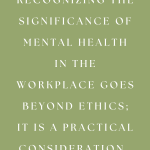Recognizing the significance of mental health in the workplace goes beyond ethics; it is a practical consideration. Extensive research consistently demonstrates the connection between positive mental health and employee experiences and behaviors. Indeed, the financial impact often drives organizational cultural shifts. However, it is essential to place genuine empathy at the forefront when prioritizing employee wellbeing. In today’s fast-paced world, mental health in the work place must be prioritized.

While HR teams traditionally address workplace mental health, it is now imperative for organizations to adopt a comprehensive, top-down approach to combat burnout and stress. By implementing strategies that promote mental health in the workplace, employers can create a nurturing and supportive environment that cultivates employee well-being and facilitates long-term success. If you want to dive deeper into self-improvement, take a look at these creative self-expression tips and inspiring quotes to help find your path.
A Deep Dive Into Mental Health
Mental health is a vital aspect of overall well-being, encompassing social, psychological, and emotional dimensions. It encompasses factors like stress management, decision-making skills, and thought patterns. Similar to physical health, mental health significantly impacts an individual’s quality of life.
Untreated poor mental health can have long-lasting negative effects on daily functioning, relationships, and overall happiness. Conditions like depression and anxiety can severely impact individuals even if they don’t exhibit visible signs of struggle. Employers must understand that mental health challenges can be hidden. We must assume that employees are fine based on appearances alone.
Creating a supportive and inclusive work environment is crucial for employers. By reducing the stigma surrounding mental health and offering resources for support, employers can foster a culture where employees feel safe discussing their mental health concerns. Prioritizing an open and empathetic workplace culture allows employers to actively promote employee well-being. On top of that, we can also address any mental health challenges that may arise.
Top 7 Self-Compassion Practices You Can Try
Why Is Mental Health In The Work Place Important?
Decreased absenteeism

Having positive mental health is essential for you in minimizing absences in the workplace. When you have good mental well-being, you tend to experience higher levels of job satisfaction, motivation, and engagement. This positive mindset leads to improved productivity. As a result, it is less likely for you to take unplanned time off due to stress-related issues. With a strong mental state, you are better equipped to manage stress, overcome challenges, and maintain a healthy work-life balance.
Better productivity

When your employer prioritizes workplace well-being, it directly enhances your overall performance and productivity. As an employee with improved mental health and well-being, you experience heightened focus, clarity, and cognitive abilities. This positive mindset empowers you to effectively cope with work-related stress, tackle challenges head-on, and maintain higher motivation levels. By nurturing your mental well-being, your employer creates an environment that supports your success and enables you to perform at your best.
Improved job satisfaction

When you prioritize mental health, you cultivate a positive work environment that values and supports you as an employee. This creates a sense of connection and investment in your work, resulting in heightened engagement, motivation, and job satisfaction. By feeling supported in your mental health, you exhibit increased loyalty and retention, contributing to a stronger and more stable workforce. When mental health is a priority, it creates a harmonious work culture where you can thrive and reach your full potential.
Amplified creativity

When you experience good mental health, it unlocks your ability to think creatively and foster innovation. As an employee who feels mentally well, you bring a fresh perspective to challenges, leading to new ideas, improved problem-solving, and a culture of creativity within your workplace.
Positive company culture

By prioritizing mental health, your company cultivates a positive culture that places value on employee well-being. This focus on mental health boosts morale, fosters strong relationships among colleagues, and creates a supportive environment where individuals feel safe and supported in seeking help and assistance whenever needed.
Is Your Self Confidence Low? Here Are 7 Tricks To Feel Your Best
7 Ways To Prioritize Mental Health In The Work Place
Prioritize work-life balance

Creating a healthy balance between work and personal life is essential to prevent burnout and prioritize your mental well-being. By setting clear boundaries, you can allocate time for relaxation, self-care, and engaging in activities that promote your mental health. Remember, taking care of yourself is just as important as your work responsibilities, and finding that balance will greatly benefit your overall well-being.
Practice open communication

Creating a culture that values open and honest communication is essential for promoting mental health in the workplace. Encourage and foster an environment where employees feel comfortable discussing their mental health concerns without fear of judgment or negative repercussions. This can be achieved by actively listening to their experiences, providing a safe space for sharing, and demonstrating empathy and understanding. Promote transparency and destigmatize mental health by normalizing conversations around it.
Encourage having a supportive environment

Creating a supportive and inclusive work environment where you feel safe and supported in sharing your experiences and seeking help without fear of judgment or repercussions is crucial for promoting mental health in the workplace. When you have a supportive environment, it allows you to openly communicate about your mental health concerns and seek the necessary help without feeling isolated or stigmatized. Having a safe space to share your experiences can help alleviate stress, anxiety, and other mental health challenges that may arise in the workplace.
Practice self-care

Prioritizing self-care and promoting activities like exercise, mindfulness, and relaxation techniques can have a profound impact on your mental health in the workplace. Regular exercise releases endorphins, improving your mood and reducing stress, anxiety, and depression. Mindfulness practices cultivate mental clarity, focus, and emotional regulation, enhancing productivity and satisfaction. Relaxation techniques, such as taking breaks, engaging in hobbies, and practicing self-reflection, recharge your mental health, prevent burnout, and promote self-awareness and resilience. Prioritizing self-care empowers you to manage stress, enhance well-being, and create a healthier work environment.
Take breaks in between tasks

Taking regular breaks throughout the workday is essential for maintaining and promoting mental well-being in the workplace. Breaks provide an opportunity to recharge, reset, and engage in activities that support mental health. By encouraging breaks, you allow employees to step away from their work tasks and engage in activities that promote relaxation and stress reduction. By promoting and encouraging regular breaks that incorporate activities like walking or mindfulness, you empower employees to prioritize their mental well-being.
Foster a positive environment

Creating a positive workplace culture has a significant impact on mental health. When a positive work environment is cultivated, it fosters a sense of psychological safety, support, and overall well-being among employees. Recognizing and celebrating achievements within the workplace helps to increase motivation and self-esteem. This recognition acknowledges the value of individual and team efforts, ch boosts morale and creates a positive atmosphere. Moreover, when employees feel appreciated and acknowledged, it enhances their sense of self-worth and contributes to a positive self-perception, positively impacting their mental health.
Constantly evaluate and adapt

Constantly evaluating and adapting mental health initiatives in the workplace is crucial for fostering a supportive environment and promoting employees’ mental well-being. By regularly assessing the effectiveness of these initiatives and gathering feedback from employees, organizations can ensure that their strategies are meeting the unique needs and challenges of their workforce. Adaptation and improvement of programs based on feedback and evaluation allow employers to remain responsive to the evolving mental health needs of employees. This ensures that the support provided continues to be relevant and effective. It also demonstrates a commitment to ongoing improvement and a willingness to listen and respond to employees’ experiences and concerns.
Your Mental Health Matters
Prioritizing mental health in the workplace is crucial for establishing a supportive and flourishing work environment. By embracing open communication, destigmatizing mental health, promoting self-care, and consistently evaluating and adapting our approaches, we can cultivate a positive workplace culture that prioritizes employee well-being. Let us remember that when we prioritize our mental health, we unlock our true potential, leading to greater productivity, job satisfaction, and overall happiness in both our personal and professional lives. Together, let’s work towards a workplace that values and supports mental health, creating a brighter and healthier future for everyone involved.
If you enjoyed reading about mental health in the work place, make sure to take a look at these self-improvement topics:
- 11 Rare Habits Mentally Strong People Have (that you should adopt today!)
- What is Your Mental Age? Find Out Now With This Test
- 25 Quotes for Self-Improvement and Personal Growth
- Stress-Reducing Techniques to Restore Balance in Your Life











Leave a Reply